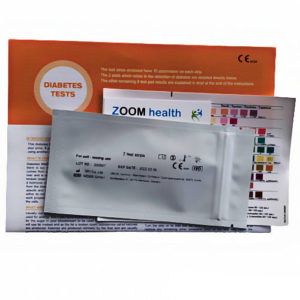Type 2 diabetes is a chronic condition that affects the way the body processes blood sugar (glucose). It is one of the most commonly diagnosed forms of diabetes and is estimated to affect nearly 387 million people worldwide.
Type 2 diabetes is caused by a combination of genetic and lifestyle factors. It is associated with an inability to produce enough of the hormone insulin, a substance produced by the pancreas that helps cells use glucose as energy. Type 2 diabetes is also associated with high levels of glucose in the bloodstream.
A diabetes test kit for the presence of glucose and ketones in urine and can help identify diabetes at an early stage, before the illness causes any symptoms.
People with type 2 diabetes are at an increased risk of developing serious health complications like heart disease, stroke, kidney disease, nerve damage, and blindness. For this reason, it is important to understand the risk factors and learn how to manage type 2 diabetes.
The most common risk factors for Type 2 diabetes are obesity, physical inactivity, age, and family history. Other risk factors include race, ethnicity, and certain health conditions. Women who have had gestational diabetes or polycystic ovary syndrome (PCOS) also have an increased risk of developing type 2 diabetes. In the UK, the number of diabetic diagnoses among people under the age of 40 is increasing faster than among those over the age of 40.
Although there is no cure for type 2 diabetes, lifestyle modifications can help manage the condition and reduce the risk of complications. Eating a balanced diet, getting regular physical activity, and maintaining a healthy weight are all important steps in helping to manage type 2 diabetes. In some cases, medications may also be needed to help control blood sugar levels.
Living with Type 2 Diabetes
Receiving a type 2 diabetes diagnosis can feel overwhelming, but with the right treatment plan you can still thrive. Here is some additional guidance on living well with T2D:
Medications
- Alongside lifestyle changes, medication is usually needed to manage T2D. Talk to your doctor about options.
- Common meds like metformin, SGLT2 inhibitors, GLP-1 agonists, DPP-4 inhibitors and more can improve insulin sensitivity, reduce blood sugar levels, minimize complications.
- Insulin therapy may eventually be needed if pancreas function declines over time. Multiple daily injections or an insulin pump help provide missing insulin.
- Work closely with your healthcare team to find the optimal medications for your situation and adjust dosages as needed.
Meal Planning Basics
- No single “diabetic diet”, but focusing on healthy whole foods is key. Emphasise vegetables, fruits, whole grains, beans, lentils, fish.
- Watch carb intake and be consistent day to day. An RD can help create a meal plan tailored for your needs and calories.
- Stay hydrated by emphasising water and low/no calorie drinks
- Monitor portions and nutrient balance to achieve a healthy body weight
Importance of Exercise
- Exercise helps improve insulin sensitivity and lowers blood sugar levels for up to 24 hours.
- Aim for 30-60 mins per day of moderate activity like brisk walking. Strength training 2-3 times a week also beneficial.
- If new to exercise, start slow and gradually increase duration and intensity under doctor guidance.
- Time exercise 1-2 hours after meals when blood sugar is often highest. Check glucose levels before, during, after moving.
Preventing Complications
- Keep HbA1c under 7% to minimise eye, nerve, kidney, cardiovascular damage
- Get dilated eye exams yearly to check for signs of diabetic retinopathy and prevent vision loss
- Monitor blood pressure & cholesterol, keep numbers in healthy range
- Inspect feet daily for cuts and irritations. Seek prompt treatment to avoid infections.
- Use lotion to prevent dry skin. Trim nails carefully. Wear shoes that fit well.
You can live fully with type 2 diabetes! Taking medications as prescribed combined with healthy lifestyle habits gives you your best chance at thriving. Connect with resources and a community who knows what daily life with T2D requires.
Type 2 diabetes is a serious condition, but with proper treatment and lifestyle adjustments, it can be managed to reduce the risk of complications. If you think you may be at risk of type 2 diabetes, it’s important to talk to your doctor.
Photo by Diabetesmagazijn.nl on Unsplash
Zoom Health is a leading UK supplier of Home Health Tests and Earplugs






